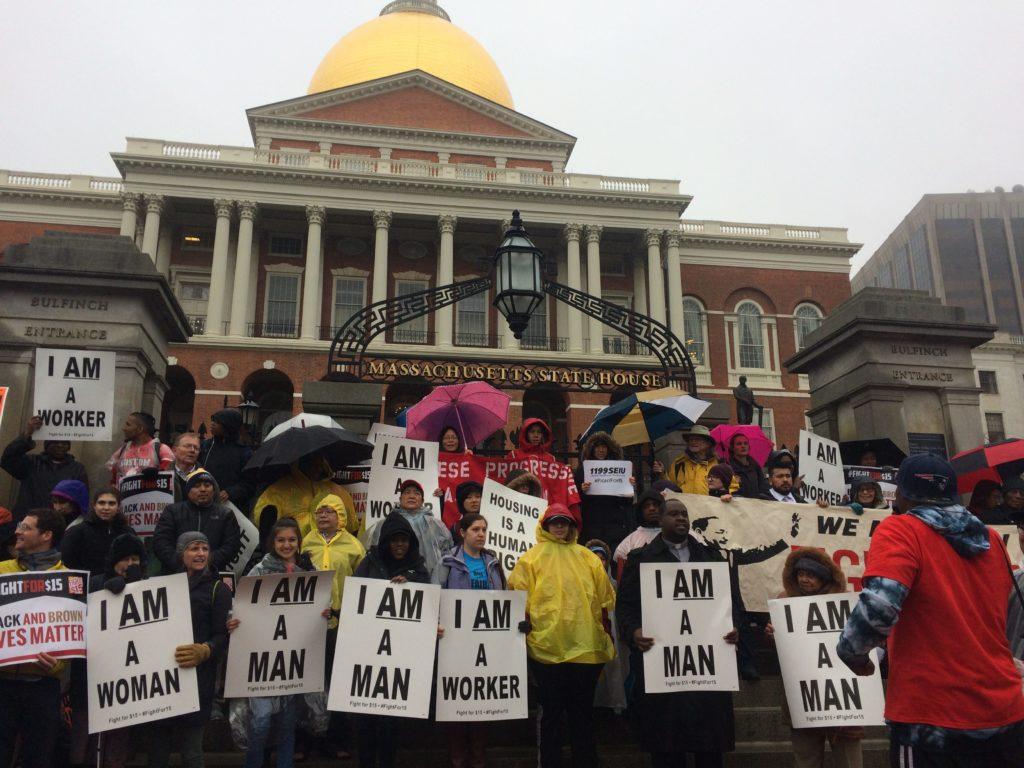By Janette Ebbers, news staff
Protesters calling for a minimum wage increase to $15 an hour rallied in the rain Tuesday while holding signs, chanting and marching around the Boston Common to the State House on the 49th anniversary of Martin Luther King Jr.’s assassination.
In remembrance of the day King was shot while standing with sanitation workers on strike, the group Fight for $15 conducted nationwide rallies advocating the importance of raising the minimum wage and drawing attention to the plight of minimum-wage workers, including ones in Boston.
Jena Benson, 19, a speaker at the event and Dunkin’ Donuts employee, said the national movement was meant to parallel the social movement for workers’ rights started by King a half-century ago.
“We’re here today because today was the day Martin Luther King got assassinated,” Benson said. “He was out there trying to support [workers] on equality, low wages, housing and how people were being treated down there […] We’re out here because we need equality for our low wages and our jobs, because we work hard and we deserve it.”
This year’s movement was funded by Service Employees International Union (SEIU), and was associated with Black Lives Matter as well as the Jewish Labor Committee, Restaurant Opportunities Center and Chinese Worker’s Union. Many protesters chanted and held signs reading “Black Lives Matter,” “Fight for $15,” and “Housing is a Human Right”. One protester referenced Sen. Elizabeth Warren (D-Mass.) in his sign: “Nevertheless, we will persist”.
After the speeches, the protesters marched to the State House to present their demands to officials inside. Coming out of the State House, the rally’s delegation said they were received warmly by staffers David Sullivan and Maddie Higgins inside, although they did not meet with Gov. Charlie Baker.
“Everyone was very welcoming,” Benson said. “They were saying they’re getting it done this year, they support us, they want us to be out here, they want us to keep fighting. They said we need to keep coming back, keep showing our support, keep coming out in the rain.”
The crowd dispersed after chanting, “We’ll be back!” at the steps of the State House.
Rev. Mariama White-Hammond opened the protest with a prayer centered on the value of workers, and was greeted with applause and cheers.
“We have become complacent about injustice, and we need you to sow a seed of human dignity in our souls,” White-Hammond said. “We have people who are working hard and barely getting by, and we know you don’t call us to live in a world where some have much and others have little.”
White-Hammond is a member of the Boston clergy known for her role speaking at the Boston Women’s March, as well as her participation in other protests.
Jenna Grady, an SEIU representative present at the rally, said organizations were taking practical steps to push legislation through local governments as well as holding rallies and protests.
“Right now, we’re going city by city and state by state because it’s easier to bite off,” Grady said. “In Massachusetts, the bill we’re pushing right now is the elimination of the sub-minimum tipped wage.”
Massachusetts has the largest gap between its sub-minimum wage ($3.75) and its minimum wage ($11.00), something organizations such as Raise Up Massachusetts are trying to address by pushing legislation to phase out the gap. Marie Billiel, a Restaurant Opportunities Center representative and one of the rally speakers, said the pay gap can have devastating financial effects for tipped workers.
“I worked the overnight shift, where drunken fraternities would run out of money, forget to tip or simply refuse to do so,” Billiel said to jeers from the crowd. “Customers commented on my body and called me patronizing nicknames […] It was uncomfortable, but the reality of losing my tips was more frightening than the sexual harassment. Without a fair wage, I was in constant danger of eviction or losing my car.”
Billiel gained notoriety after her blog exposé on sexual harassment in her restaurant contributed to its shutdown.
Common arguments against raising the minimum wage include economic predictions of increased unemployment — an argument dismissed by Grady.
“It’s just not a particularly valid argument if you do the calculations,” Grady said. “I think the argument is a lot of the time that if you increase the minimum wage you’ll increase unemployment by forcing automation, and the reality is we’re already automating, and that’s where manufacturing jobs have gone. The jobs aren’t going away to other countries so much as automation.”
The rally focused, though, on the importance of human rights more than economic impacts, featuring multiple social movements and groups ranging from Black Lives Matter to the Jewish Labor Committee. White-Hammond, ending her prayer, said the movement’s goal was ideological as well as functional.
“We can’t live in a country where we’re willing to spend billions of dollars to fight wars somewhere else, but we’re not willing to give people what they deserve as workers right here,” White-Hammond said. “We are calling for a revolution of values in our country that says, ‘We’re going to act like people have human dignity, and we’re going to pay them a wage that reflects human dignity.’”









